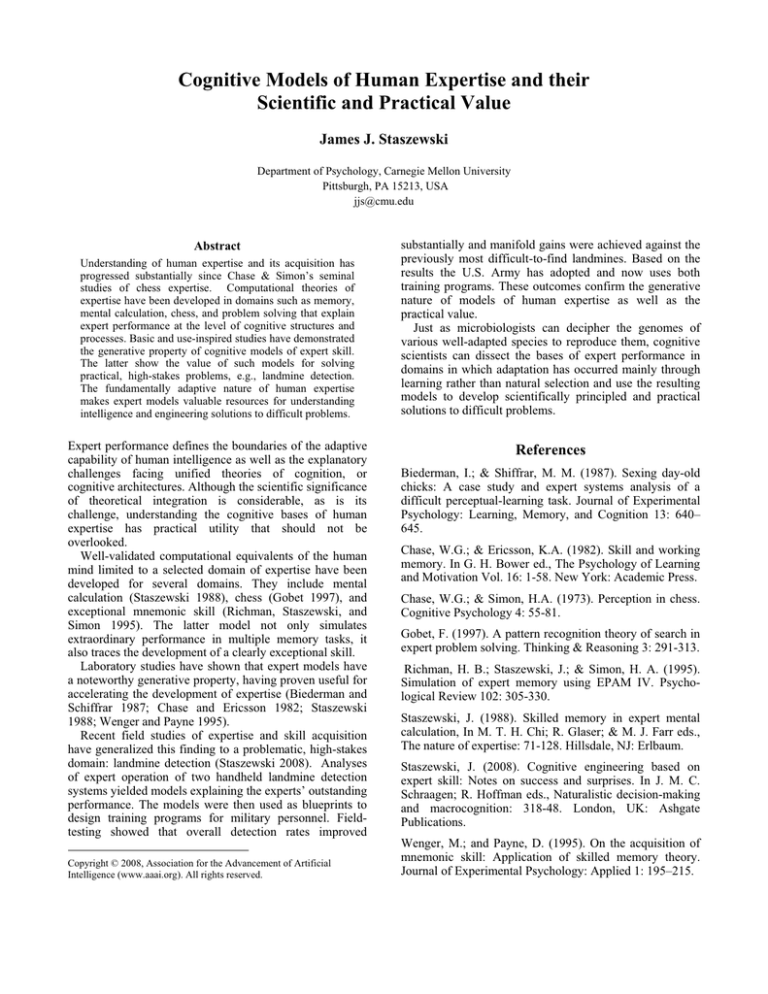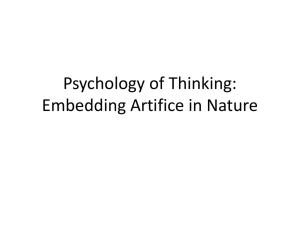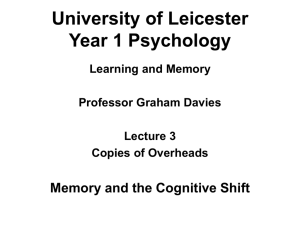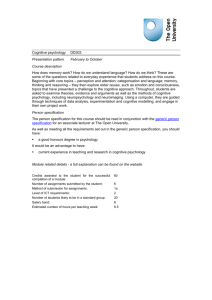
Cognitive Models of Human Expertise and their
Scientific and Practical Value
James J. Staszewski
Department of Psychology, Carnegie Mellon University
Pittsburgh, PA 15213, USA
jjs@cmu.edu
Abstract
Understanding of human expertise and its acquisition has
progressed substantially since Chase & Simon’s seminal
studies of chess expertise. Computational theories of
expertise have been developed in domains such as memory,
mental calculation, chess, and problem solving that explain
expert performance at the level of cognitive structures and
processes. Basic and use-inspired studies have demonstrated
the generative property of cognitive models of expert skill.
The latter show the value of such models for solving
practical, high-stakes problems, e.g., landmine detection.
The fundamentally adaptive nature of human expertise
makes expert models valuable resources for understanding
intelligence and engineering solutions to difficult problems.
Expert performance defines the boundaries of the adaptive
capability of human intelligence as well as the explanatory
challenges facing unified theories of cognition, or
cognitive architectures. Although the scientific significance
of theoretical integration is considerable, as is its
challenge, understanding the cognitive bases of human
expertise has practical utility that should not be
overlooked.
Well-validated computational equivalents of the human
mind limited to a selected domain of expertise have been
developed for several domains. They include mental
calculation (Staszewski 1988), chess (Gobet 1997), and
exceptional mnemonic skill (Richman, Staszewski, and
Simon 1995). The latter model not only simulates
extraordinary performance in multiple memory tasks, it
also traces the development of a clearly exceptional skill.
Laboratory studies have shown that expert models have
a noteworthy generative property, having proven useful for
accelerating the development of expertise (Biederman and
Schiffrar 1987; Chase and Ericsson 1982; Staszewski
1988; Wenger and Payne 1995).
Recent field studies of expertise and skill acquisition
have generalized this finding to a problematic, high-stakes
domain: landmine detection (Staszewski 2008). Analyses
of expert operation of two handheld landmine detection
systems yielded models explaining the experts’ outstanding
performance. The models were then used as blueprints to
design training programs for military personnel. Fieldtesting showed that overall detection rates improved
Copyright © 2008, Association for the Advancement of Artificial
Intelligence (www.aaai.org). All rights reserved.
substantially and manifold gains were achieved against the
previously most difficult-to-find landmines. Based on the
results the U.S. Army has adopted and now uses both
training programs. These outcomes confirm the generative
nature of models of human expertise as well as the
practical value.
Just as microbiologists can decipher the genomes of
various well-adapted species to reproduce them, cognitive
scientists can dissect the bases of expert performance in
domains in which adaptation has occurred mainly through
learning rather than natural selection and use the resulting
models to develop scientifically principled and practical
solutions to difficult problems.
References
Biederman, I.; & Shiffrar, M. M. (1987). Sexing day-old
chicks: A case study and expert systems analysis of a
difficult perceptual-learning task. Journal of Experimental
Psychology: Learning, Memory, and Cognition 13: 640–
645.
Chase, W.G.; & Ericsson, K.A. (1982). Skill and working
memory. In G. H. Bower ed., The Psychology of Learning
and Motivation Vol. 16: 1-58. New York: Academic Press.
Chase, W.G.; & Simon, H.A. (1973). Perception in chess.
Cognitive Psychology 4: 55-81.
Gobet, F. (1997). A pattern recognition theory of search in
expert problem solving. Thinking & Reasoning 3: 291-313.
Richman, H. B.; Staszewski, J.; & Simon, H. A. (1995).
Simulation of expert memory using EPAM IV. Psychological Review 102: 305-330.
Staszewski, J. (1988). Skilled memory in expert mental
calculation, In M. T. H. Chi; R. Glaser; & M. J. Farr eds.,
The nature of expertise: 71-128. Hillsdale, NJ: Erlbaum.
Staszewski, J. (2008). Cognitive engineering based on
expert skill: Notes on success and surprises. In J. M. C.
Schraagen; R. Hoffman eds., Naturalistic decision-making
and macrocognition: 318-48. London, UK: Ashgate
Publications.
Wenger, M.; and Payne, D. (1995). On the acquisition of
mnemonic skill: Application of skilled memory theory.
Journal of Experimental Psychology: Applied 1: 195–215.






